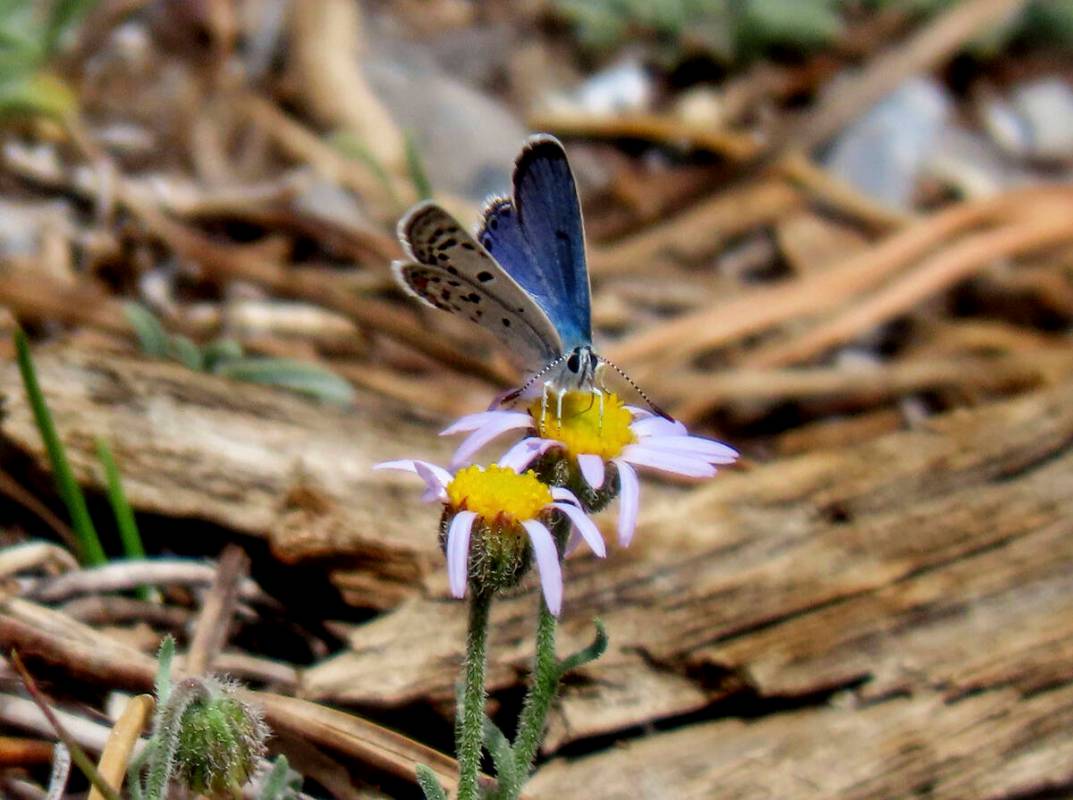Butterfly lawsuit settlement clears path for Lee Canyon bike park

Plans for a mountain bike park at Lee Canyon ski resort cleared a significant hurdle this month after the company settled a federal lawsuit brought by a conservation group aiming to protect an endangered butterfly species exclusive to the Spring Mountains.
Stipulations for building the three trails, which are expected to be completed in the summer, were approved by U.S. District Judge Richard Boulware on Jan. 19, court records show.
The agreement calls for habitat buffer zones where construction would not be allowed under most circumstances and a $250,000 pledge from the resort to UNLV for research on the Mount Charleston blue butterfly. The payments would be made in five installments of $50,000 per year, beginning in 2022.
“Lee Canyon’s commitment to Play Forever means protecting the Spring Mountains,” Dan Hooper, the resort’s general manager, wrote in a statement. “That’s why for years, we’ve worked with scientists and local conservation groups to ensure that our bike park’s design minimizes impact on the environment. We’re proud of the time we’ve invested and the knowledge we’ve acquired. This development can serve as a roadmap for how to develop managed recreation areas responsibly.”
The Center for Biological Diversity, a national nonprofit, filed the lawsuit in 2020.
“We feel this settlement minimizes impact to the butterflies while providing very important resources to put them on the path to recovery,” said Patrick Donnelly, Great Basin director for the nonprofit group.
Research on the blue butterfly will be led by UNLV science professor Daniel Thompson, who Donnelly said “spends every summer crawling” around the Spring Mountains searching for the species.
A lot is unknown about the blue butterfly, Donnelly said, adding that the research will not only help understand the species but also “inform the conversation.”
The lawsuit outlined the danger to the rare butterfly, a subspecies of Shasta blue butterfly that is known to exist only in the Spring Mountains.
The blue butterfly, which is on the “brink of extinction,” was designated an endangered species in 2013, and the U.S. Fish and Wildlife Service in 2015 appropriated 5,214 acres in the Spring Mountains as a critical habitat, the complaint said.
The construction would impact 120 of those acres, according to the complaint.
Construction of the trails and the subsequent recreation would occur within Lee Canyon, where half of the designated habitat exists, the complaint said.
Out of the other two designated habitats, no butterflies have been spotted in the North Loop since 1995. And half of the South Loop — which historically contained “the most robust population of butterflies” — was torched by the Carpenter 1 fire in 2013, the complaint said.
‘Downhill mountain bike park’
The two-month construction of the three-trail attraction is slated to begin in late June, Lee Canyon’s statement said.
The trails will accommodate beginner, intermediate and advanced riders, the statement said. Additional trails were expected to be built in the fall, for a total of 12 miles.
Riders can access the trails from chairlifts that also carry bikes, the release said.
“Lee Canyon’s goal is to offer diverse and inclusive outdoor experiences,” Hooper said. “We are excited to add downhill mountain biking, which will offer another opportunity to recreate at Lee Canyon.”
The design and construction firm Gravity Logic has developed similar parks in Oregon and Vermont, the release said.
“Lee Canyon’s new mountain bike trails will add a world-class system of gravity trails in our state and create new opportunities for amazing outdoor adventures for Nevada families and visitors,” Colin Robertson, administrator of the Nevada Division of Outdoor Recreation, said in the release.
The plan was first submitted in 2011 to the U.S. Forest Service, and nearly a decade of “environmental analysis” preceded the lawsuit.
Contact Ricardo Torres-Cortez at rtorres@reviewjournal.com. Follow @rickytwrites on Twitter.